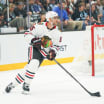As Jeremy Colliton sat at the table inside MB Ice Arena on Tuesday afternoon - a microphone and nameplate designating his spot - he just barely allowed himself to flash the occasional smile. The smiles would quickly turn to a more serious, focused expression.
"It's a bit surreal for sure," he said. "A lot has been happening the last few days. I guess there's a lot to do right now and there's an urgency to get the team ready for Thursday, so not a lot of time to think about where we're at. I think once we settle into the schedule and get closer to where we want to be preparation-wise, I'll have a bit more time to be pleased."
Just named the 38th head coach in Blackhawks history hours before, there was no time to be excited or feel at all accomplished. There's work to be done, and game one of a new era starts on Thursday.
"I'm excited to have Jeremy Colliton join us as our new head coach," Blackhawks President and CEO John McDonough boomed into the microphone.
And so it begins.
FEATURE: Youthful Colliton ready to lead Blackhawks
Get to know the new head coach of the Chicago Blackhawks, his coaching style and motivation as we sat down with him and some players to discuss the change
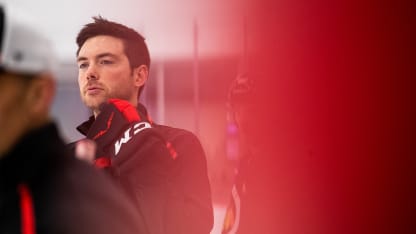
For McDonough, Chairman Rocky Wirtz and Senior Vice President and General Manager Stan Bowman - the three who joined Colliton in front of the interview backdrop - it was a bittersweet announcement to be sure.
How do you transition from the greatest coach in franchise history, a surefire Hall of Famer, and three-time Stanley Cup champion? Well, it's not easy.
"I have a huge amount of respect for Joel [Quenneville]," said Colliton. "They're huge shoes to fill and I won't try and fill them. I've got to be myself and we're different people, so I'll bring different things to the table, different ideas to the table. Sometimes that can bring some energy."
Replacing Quenneville behind the Blackhawks bench is a decision the organization say was not taken lightly. However, they stand today in firm belief they have found the right man to press forward with.
"I've had a chance to get to know Jeremy a little bit over the last year or so," said McDonough. "He's measured, he's bright, he's got a very good hockey mind and he's an excellent communicator. That is the one thing that really, really stood out. He will be given everything he needs to succeed."
The recruitment of Colliton began more than a year ago when Bowman convinced the young, rising coach to leave Sweden for North America.
The former New York Islanders forward was in Sweden when he developed a taste for coaching after a playing career cut short.
"The year I took off, I was volunteering with the junior team and the head coach had a family matter and he asked me to run the bench," he said. "That's the first time I had ever done that. It was good hockey, a good league. I stepped in and felt normal at that time. I thought to myself, 'maybe I can do this.'"
Taking over the helm of Mora IK in the Allsvenskan league, Colliton oversaw a club that steadily improved over time. That was until his final season (2016-17), in which the team finished with a league-best 35-4-13 record. The season culminated in the club moving up a league.
Upon the conclusion of the season, Colliton joined the Blackhawks American Hockey League affiliate in Rockford. Under his guidance, the IceHogs finished 40-28-4-4 and reached the Calder Cup Playoffs. After first and second-round sweeps of the Chicago Wolves and Manitoba Moose, the IceHogs reached their first-ever Western Conference Final.
Observing how the IceHogs came together, the Blackhawks knew they had something special in Colliton.
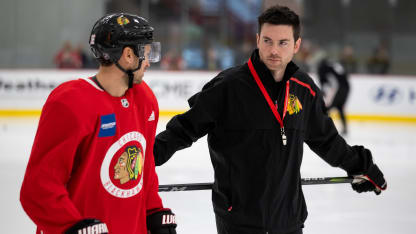
"The thing that the playoff success showed was that there was a progression in their team from the beginning of the year," said Bowman. "That shows a couple things. It shows that your coach has had an impact on your players. Especially in the American [Hockey] League, you've got players where their game's not quite all there, which is why they're not in the NHL, so you've got progression from the beginning of the year to the end. The people that help make that happen are the coach and the coaching staff. I think that's a great strength of Jeremy's.
"I was able to watch it firsthand throughout the season and not only watch our team play but talk to Jeremy on a regular basis. Every week we would talk about the team down there. And then in the playoffs, I got a chance to follow the team around and see the way they really hit their stride."
Colliton's ability to bridge the gap between young players and veterans and to inspire personal growth in either was yet another solid mark on his rookie report card.
"The thing that was impressive to me is that it wasn't just the young players that got going in Rockford," explained Bowman. "We had some veteran guys, Cody Franson, and Lance Bouma, guys like that who I think when they first got to Rockford I think it's fair to say they weren't too excited to be in the American [Hockey] League. They had been NHL players for a long time and that can be a challenge."
"I think they found out how much fun they can have when they're all working together and the team is playing as a team. So those were all really positive signs and they were things that you make note of and you observe and you start to realize that Jeremy's got some really special talents."
Jeremy Colliton press conference
Erik Gustafsson was one of those players unhappy to be in the AHL.
Freshly assigned to Rockford, the young defenseman was upset. It probably showed in his play.
"When I got sent down last year, he took me into a room and told me, 'I'm going to help you and do everything I can to help you get back to the NHL as fast as you can.' That helped me relax a little bit," said Gustafsson. "I was mad when I got sent down. That's something he did. He brings the best out of you."
Gustafsson saw his game develop, as did his confidence.
"When I was down there, he made me play my own game and made me be a better person on the ice. He let me make mistakes. He knew when he could yell at guys, but he's very calm on the bench. He doesn't scream that much, but he makes guys better. In Rockford, I saw a couple guys step up when he came. He helped a lot down there, even me. He helped me come back here to the NHL. Just a positive vibe from him. He's a great guy, great coach."
Colliton understands communication is a major part of coaching, and it happens to be something he's good at.
"I'm just being honest. There's no agenda there," said Colliton. "I want to help you be better. With each player, you try to find what they need at the right time to be at their best and be the best version of yourselves. It's OK to make mistakes. What I want is for you to show the intention to do the right thing. If you show the intention to do the right thing but still make the mistake, I can live with that."
Just try not to make the mistake again. Learn from it.
"There's still learning to be done at the NHL level," he said. "The league is younger than ever, so they need help. The skill level is also higher than ever. The skill level is off the charts, but how to play is another thing. Development isn't over now, just because you made the NHL. It's individual development, team development, tactical development. We've got to do it all."
It's not just Gustafsson who saw development and progress under Colliton in Rockford. Every player in the Blackhawks locker room, who has played under him, has good things to say about the leadership and coaching of the club's new bench boss.
"I loved him when I was in Rockford," said Blackhawks forward Luke Johnson, who spent 73 games under Colliton in 2017-18. "He was really good for me and a lot of the young guys down there.
"He's pretty laid back and he's a very smart guy, a very intelligent guy. You can tell he played for a long time and he's very approachable too. If you need to talk you can go talk to him or whatever and just kind of get feedback from him or whatever. I think I was very impressed with that and he's just very smart and very approachable."
"He understands how to manage the team," said fellow forward John Hayden, who played 24 regular season games for Colliton. "He's not that far removed from the game himself. I think he uses that to his advantage and I think his demeanor overall will definitely help us going forward. We're all excited to get going on Thursday. I think you could tell at practice that guys were pretty motivated to get this thing turned around."
Even Blackhawks rising young star Alex DeBrincat has a positive opinion of Colliton, having just played for him at last year's Traverse City NHL Prospects Tournament.
"I had that rookie tournament with him. I like him," said DeBrincat. "He's a really good guy. I talked to him a few times and I think he knows what he's talking about. Good to have him here and we'll see what we can do with him."
Brent Seabrook has a more personal connection with Colliton.
The two were teammates back at the World Juniors in 2004, and they even met before that.
"Jeremy and I played together when we were 11," said Seabrook. "We played summer hockey together, we played against each other and our team invited him to a tournament. I can't even remember when it was, I'll have to ask my Dad, but it was a long time ago. He played with us for a tournament and growing up we kind of followed the same career path as kids, played in the Western Hockey League against each other, played for the World Juniors together, when he was playing we had the same agent. So, a lot of connections there. It was nice to see him come back to North America last year and get the job in Rockford. Sounds like he's been doing some really good things, obviously with Rockford last year going to the third round."
It's a perfect example of how Colliton's age could be of some benefit.
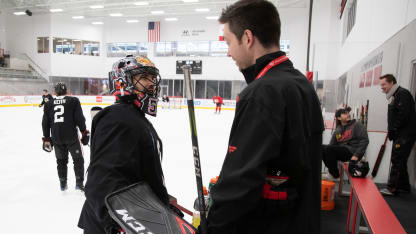
At just 33 years-old, Colliton is now the youngest head coach in the NHL. He's at an age where, fresh out of his playing days, Colliton works well with younger players. He can also connect with the veterans on the Blackhawks roster, four of whom are slightly older than the coach.
Some may look at his age as a negative or a lack of experience. That's OK, because Colliton uses it as more of an advantage.
"That's what I am, so I'm going to use it to my advantage," Colliton said. "If I was older and more experienced, then I would use my experience to my advantage. The tools you have in your toolbox, you have to use them. When you hear the question, sometimes it can be negative but I don't look at it that way. How can I help the team win? That's how I prove my value."
Age is not an issue, says Gustafsson, who saw Colliton work with all levels of experienced players in Rockford.
"That's what he did in Rockford last year," Gustafsson said. "He brings the best out of guys, the younger guys too. I haven't seen him coach many of the older guys [here], but he can help them too. It's fun for him that he's getting his chance."
"He brings a whole lot of energy," said DeBrincat of his new youthful coach. "He's smiling out there, he's talking to us, he's trying to get to know us. I think that's a good thing to have that connection and start it as soon as today. It's good to have him here."
Toews echoed those sentiments.
"It is different, considering what we're used to but from what I hear and what I've seen so far, Jeremy Colliton brings a lot of youthful energy to the game and he's got a lot of experience on the ice as well," said the Blackhawks captain. "I think he understands how to get through to guys and get through to each player and how to get the best from them. I've heard nothing but good things from the guys that played for him in Rockford last year. Looking forward to what he can bring to our team here."
Toews on coaching changes
"I guess time will tell, right? We'll see," said Patrick Kane. "I think a lot of us have heard some good things about him as a coach. Seems like he's had some success in Rockford as well, and you see it nowadays whether it's GMs or head coaches or whatever it is, it doesn't really matter your age anymore."
"I love competition, I love winning," said Colliton when asked what motivates him.
"The feeling after a game when you've won with that group, it's more as a player, it's not quite as good as a coach but it's close. That feeling of accomplishment. You went into battle and you found a way to get it done. That's addicting."
It's that drive to win that has pushed Colliton to the brink of his debut behind an NHL bench. It's also part of the reason the players and Blackhawks leadership are relatively optimistic about their new coach.
"I always thought that he'd get his chance one day in the NHL, whether it be in a few years or whatever," said Johnson. "I wasn't expecting right away, but I'm very happy for him and I'm excited for him to work with us and get going here."
"At some point, this year or whenever, I knew he would be an NHL coach because how he coached us last year," Gustafsson said. "He's one of my best coaches. I talked to some of the guys he coached in Sweden too. Everyone that has had him as a coach says positive things about him."
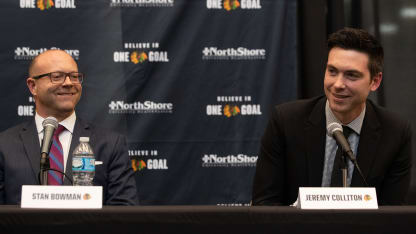
Now that he's in the NHL, Colliton's first order of business is to get the team ready to play on Thursday, and then it's to win games which will inevitably earn the respect of the roster.
"The challenge is to hit the ground running," said Colliton. "We don't have much time before we play Thursday. We had a good practice today, good energy, we pushed on a few things that we want the guys to focus on. It's just communication with everyone as early as possible, with as many as possible so that everyone's on the same page and they know what the plan is, how we plan to win."
It's not an easy thing to do, getting a roster of adults on the same page in just a few days.
"I had to be active today," Colliton said after his first practice. "As you say, there's not a lot of time. We're not going to have time for long sit downs with everyone, but I think it's important to let everyone know that they can always come to me, they can always come to the staff and we can have a conversation about whatever's going on. I don't want guys going home wondering where they fit in or what we want out of them or what the expectations are. That's no good.
"We want them to go home happy, we want them to come to the rink in the morning or the next morning happy, because then they're going to be productive and they're better players. That's a big part of my job is creating an environment where they can be their best every day and they're getting better every day. So, we did a lot today, we'll do a lot tomorrow and that will continue on."
So what's the plan? Now that Colliton is at the helm, the team has a blueprint that he would like to follow.
"We want to have pressure on the puck, we want to be a skating team," said Colliton. "We want to be aggressive all over the ice so we can have the puck. The game is a lot easier when you play in the offensive zone."












